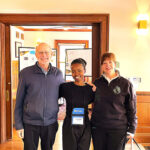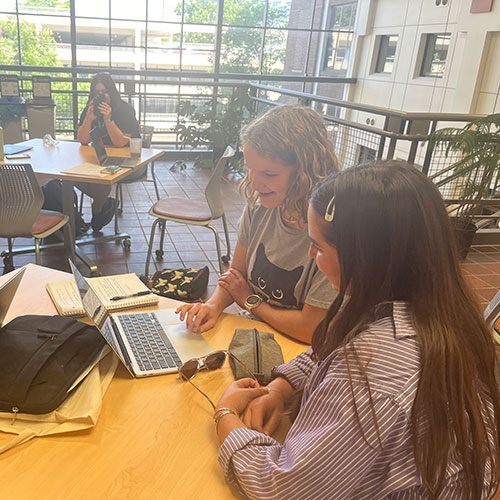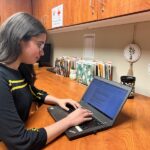
Psychology major gains firsthand experience researching the behavior of young children

Ella Peterson ’25, a psychology major at The College of Wooster, spent the summer working with children as a research intern at the Michigan Summer Program in Cognition and Early Development in Ann Arbor, Michigan. The program, jointly hosted by four University of Michigan developmental psychology laboratories, pairs students with a graduate student or postdoctoral fellow mentor to work on a research project focused on the cognitive and social foundations of young children’s behavior. Peterson found support from fellowship mentor Elizabeth Schiltz, professor of philosophy at Wooster. Throughout her fellowship, Peterson conducted test trials, built programming skills, and gained a strong foundation for academic research, which confirmed her interest in research and obtaining a doctoral degree in psychology.
“I realized how academics interact with one another and how much collaboration is required for everyone to be successful.”
—Ella Peterson ’25
Q: How did you learn about the internship opportunity for your APEX Fellowship?
Peterson: I found my internship online while searching for psychology research programs. I don’t recall exactly where I found the program, but I remember that the American Psychological Association had a good list to look at. I applied because I liked the research topics, which combined developmental and cognitive psychology, and the program allowed me to study children.
Q: What interests you most about the work you did?
Peterson: I’ve enjoyed seeing the behind-the-scenes aspects of academic research, learning about the assigned project, and testing the kids.
Q: Who was your fellowship mentor and how did they help you to succeed in this position?
Peterson: My mentor was Elizabeth Schiltz. She responded actively to my weekly reflection, answered all my questions about the APEX Fellowship, and sent me instructions for the touchpoints over email, which I appreciate because it made them easy to access.
Q: What are some skills you’ve learned that you see yourself carrying forward in your career?
Peterson: I realized how academics interact with one another and how much collaboration is required for everyone to be successful. I also learned how to use R programming for statistics and how to get studies off the ground.
Q: How has the internship helped you to see what’s next for you?
Peterson: I confirmed that I would like to continue to graduate school and aim for a Ph.D. in psychology. I’m looking at possible graduate programs and will probably apply for lab manager positions. I spoke to a few lab managers at the program who told me how much they enjoyed it.
Posted in Experiential Learning, Showcase Stories 2024 on August 11, 2024.
Related Posts
Related Areas of Study
Psychology
Do research, work with faculty mentors, and tailor a psychology program to your interests
Major Minor

